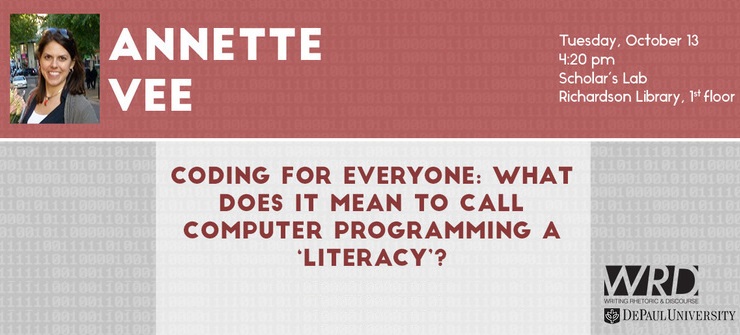The Writing, Rhetoric and Discourse Department will be hosting Annette Vee, associate professor of English at the University of Pittsburgh. She will be giving a talk called, “Coding for everyone: What does it mean to call computer programming a ‘literacy’?”
The event will be held Tuesday Oct. 13, from 4:20-5:50 in the Scholar’s Lab on the first floor of the Richardson Library.
Annette was a student of renowned Writing Studies literacy scholar Deborah Brandt and has taken up the torch of studying literacy in the 21st century. Annette writes on how computer code is a kind of writing, how coding can/will evolve as the next mass literacy and the rise of computational mentality. Her forthcoming book draws parallels between the rise of literate mentality in medieval England and the rise of computational mentality in 20th/21st century America.
Annette’s talk promises to be accessible as well as generative of discussion about these timely issues concerning literacy. In her own words:
“Code.org, Made with Code, Yes We Code, Black Girls Code and countless other initiatives are aiming to introduce coding to populations underrepresented in the technology sector, especially women and minorities. “Everyone should learn to code” they argue, and often invoke the ubiquity and utility of reading and writing to justify that claim. But this is no recent phenomenon. Since the 1960s, computer enthusiasts have employed the concept of “literacy” to underscore the importance, flexibility, and power of writing for and with computers. What does it mean for both coding and literacy to be linked together in this popular discourse? In this talk, I trace histories of mass programming and literacy campaigns to highlight similar shifts in their driving ideologies over time. While the ideology behind many contemporary coding campaigns echoes Silicon Valley values, I argue that reaching back to the more lofty goals of earlier literacy campaigns—literacy for citizenship, intellectual development, and as a moral good—may help these campaigns further their ostensible goal of coding for everyone.”
Unlike traditional evening speaker events, this will be mixed format event with the aim to create a dynamic discussion atmosphere. Annette will talk for 45 minutes, followed by a Q and A and then small group discussion (the room is set up for table topics) and/or a short and accessible collaborative digital activity using the Scholar’s Lab unique set-up.
This is a great opportunity for students interested in the Digital Humanities Certificate to hear from a scholar in the field and discuss some of its most pertinent issues
Follow these links to Annette’s website and blog for more information.
